- Posted on
- • Uncategorized
Web Search Engines You’ve Never Heard Of
- Author
-
-

- User
- Ixavence
- Posts by this author
- Posts by this author
-
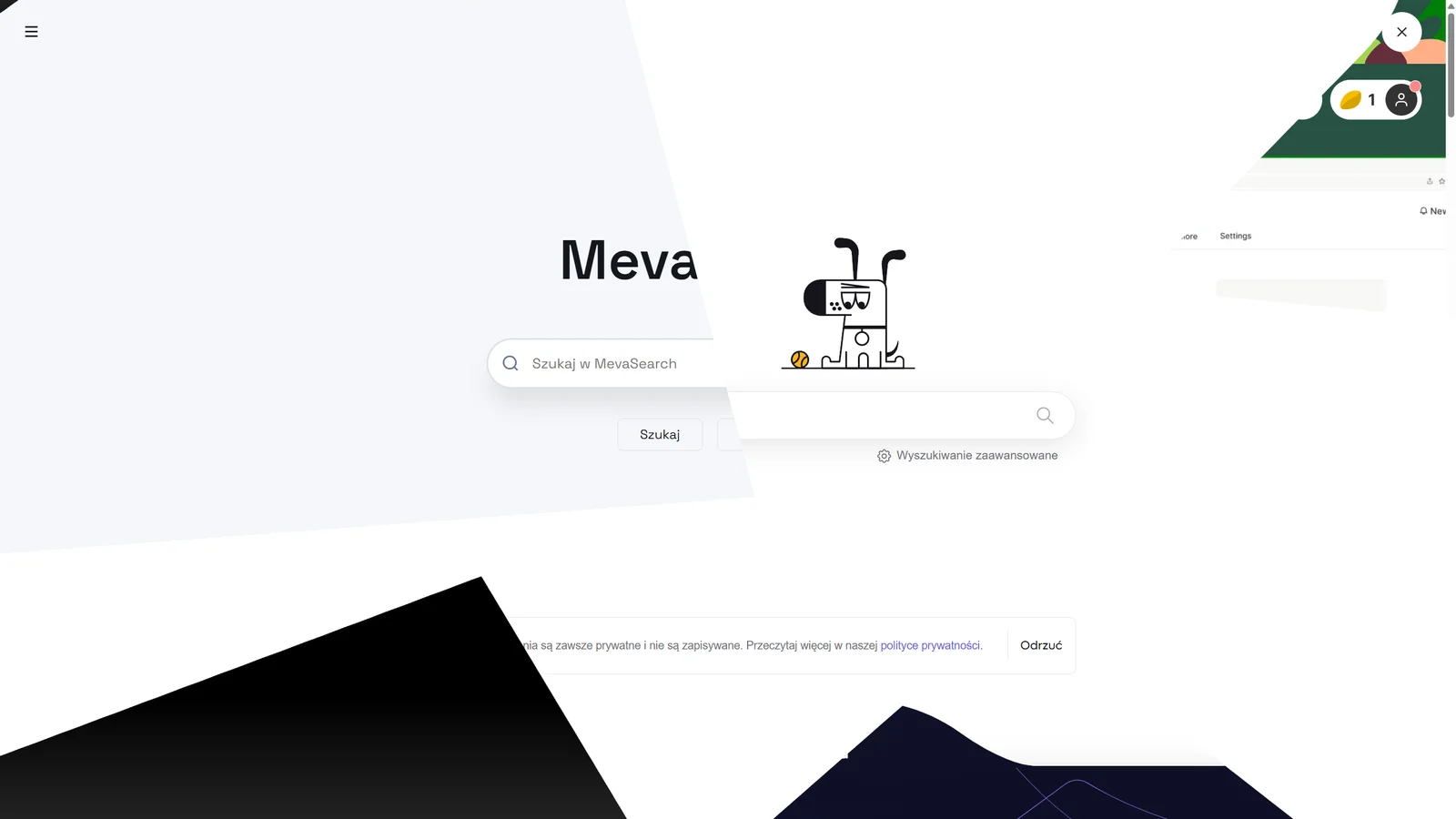
Most of us associate online searching only with Google, Bing, or Yahoo, and that’s usually where the list ends. Yet, there’s a whole world of smaller search engines out there with their own ideas of how searching the web should work. They focus on privacy, ecology, independence, or even… community. Here are some of them.
Qwant – Europe’s answer to Google
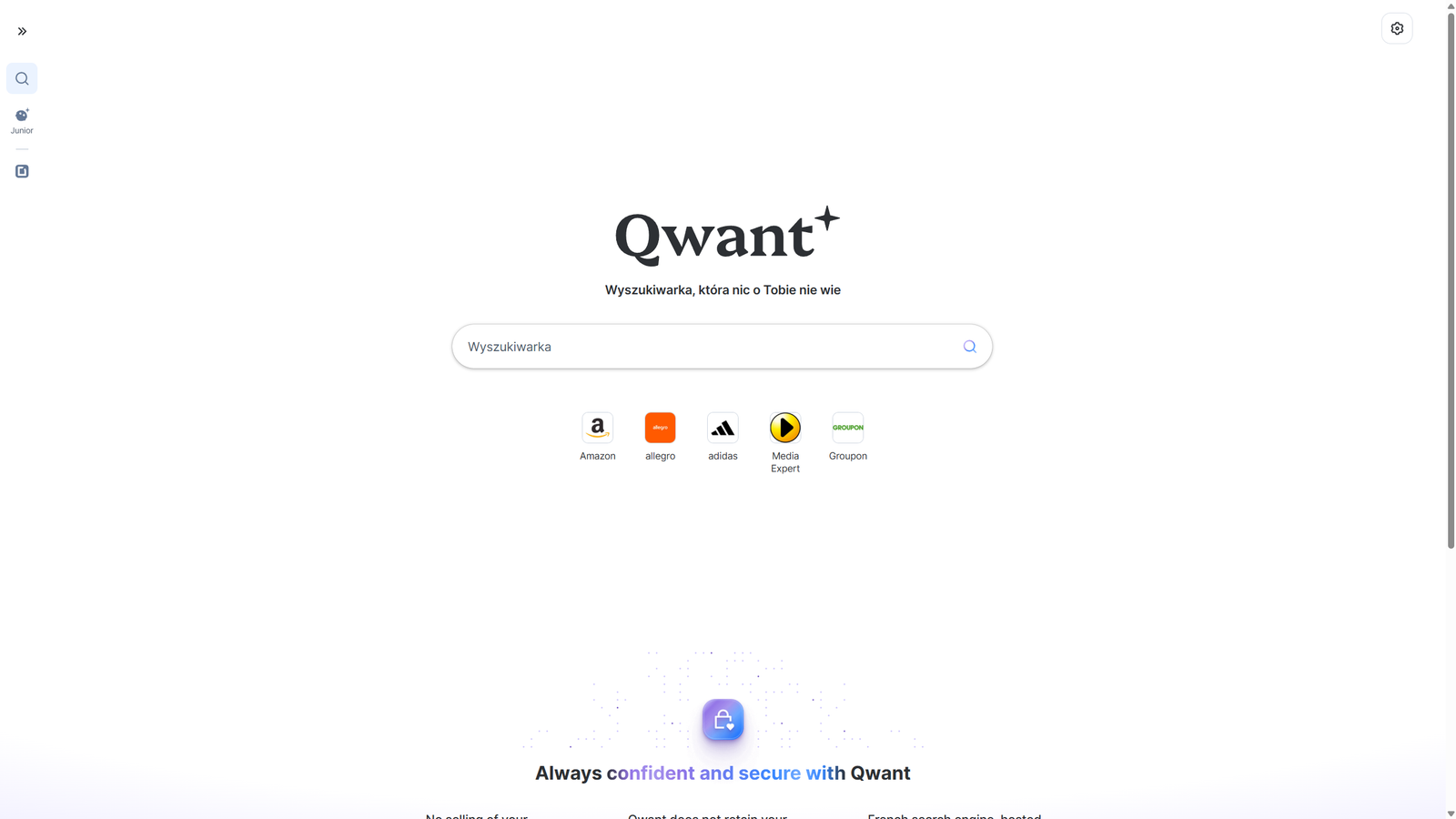 A French search engine launched in 2013. It uses Bing’s engine but doesn’t track users or personalize results – everyone sees the same thing. This helps you avoid the so-called information bubble. Qwant also develops its own services, such as Qwant Maps and Qwant Junior (for kids), showing that they don’t want to be “just another layer on top of Bing.”
A French search engine launched in 2013. It uses Bing’s engine but doesn’t track users or personalize results – everyone sees the same thing. This helps you avoid the so-called information bubble. Qwant also develops its own services, such as Qwant Maps and Qwant Junior (for kids), showing that they don’t want to be “just another layer on top of Bing.”
Ecosia – the search engine that plants trees
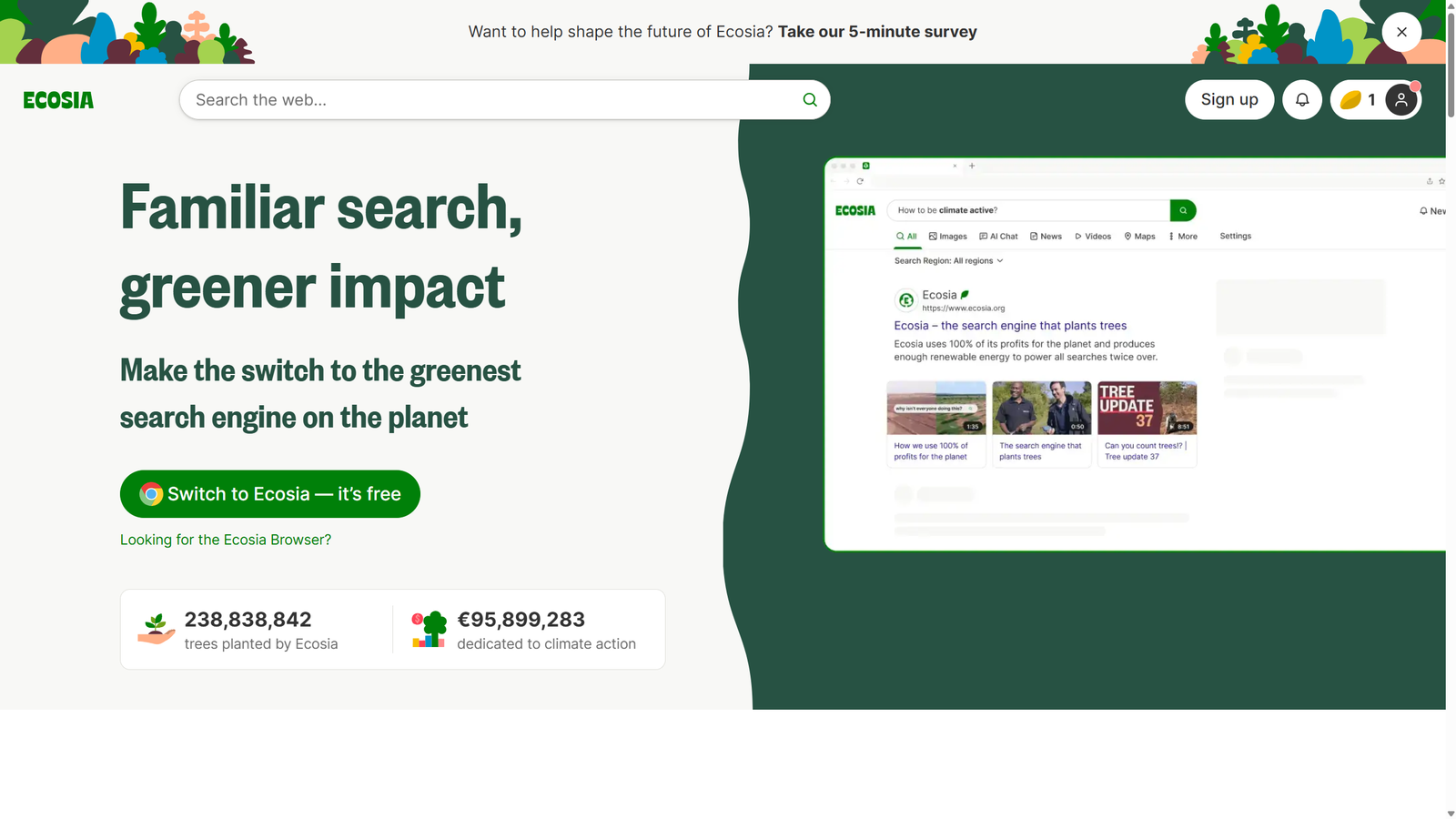 Here, every ad really makes a difference – revenue from ads and online shopping goes to reforestation projects. Ecosia has been funding tree planting in places like Burkina Faso for years, boasting 3 million new trees already in 2015. Using this search engine means you’re actively supporting the environment.
Here, every ad really makes a difference – revenue from ads and online shopping goes to reforestation projects. Ecosia has been funding tree planting in places like Burkina Faso for years, boasting 3 million new trees already in 2015. Using this search engine means you’re actively supporting the environment.
Brave Search – independence and privacy
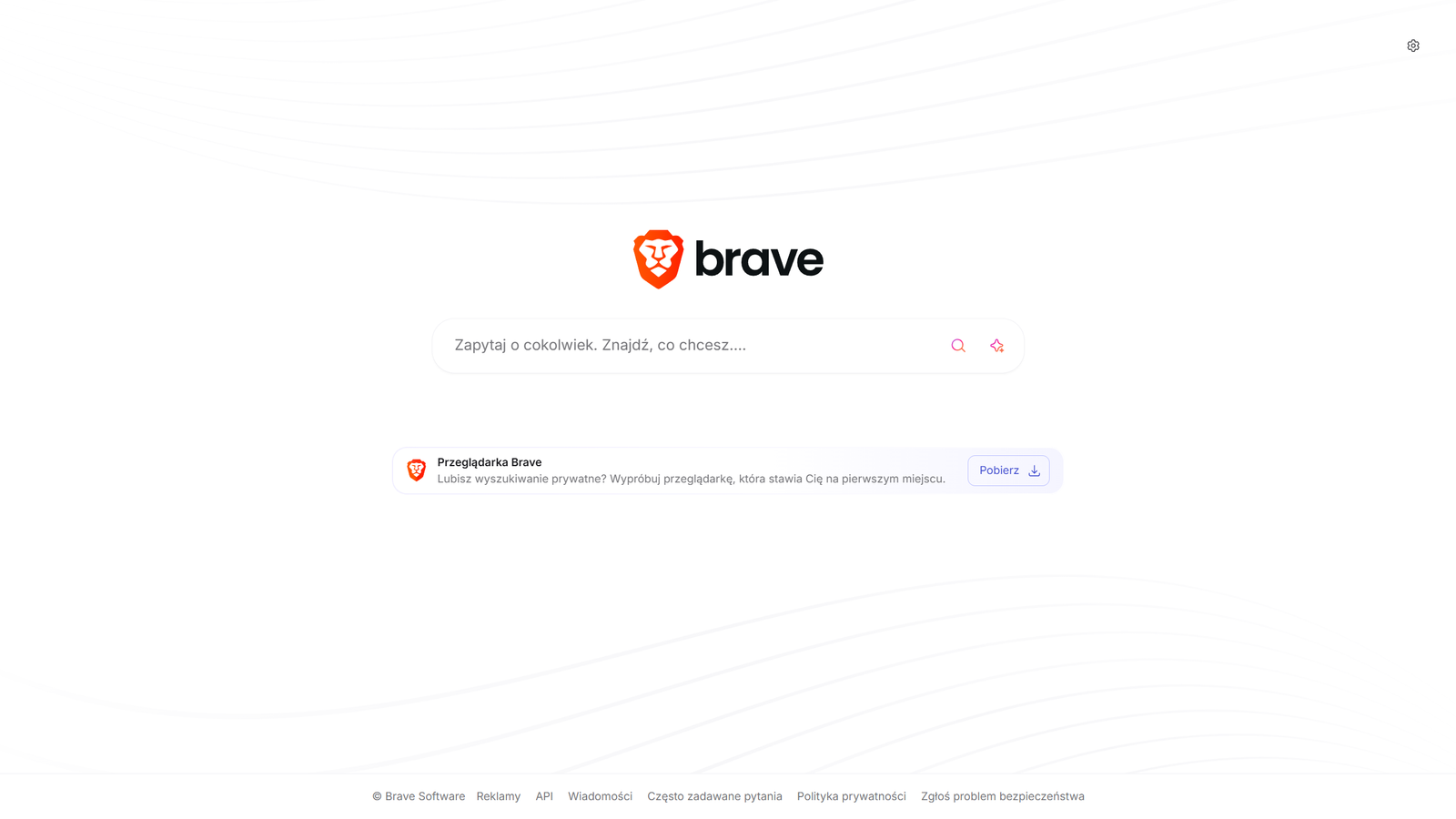 Created by the team behind the Brave browser, it stands out with its own index (not relying on Google or Bing). It doesn’t track users, profile them, or manipulate results. It also offers a choice – free results with ads or a premium ad-free version. Brave plans to open its ranking model so anyone can see how the algorithm works.
Created by the team behind the Brave browser, it stands out with its own index (not relying on Google or Bing). It doesn’t track users, profile them, or manipulate results. It also offers a choice – free results with ads or a premium ad-free version. Brave plans to open its ranking model so anyone can see how the algorithm works.
Startpage – Google without Google
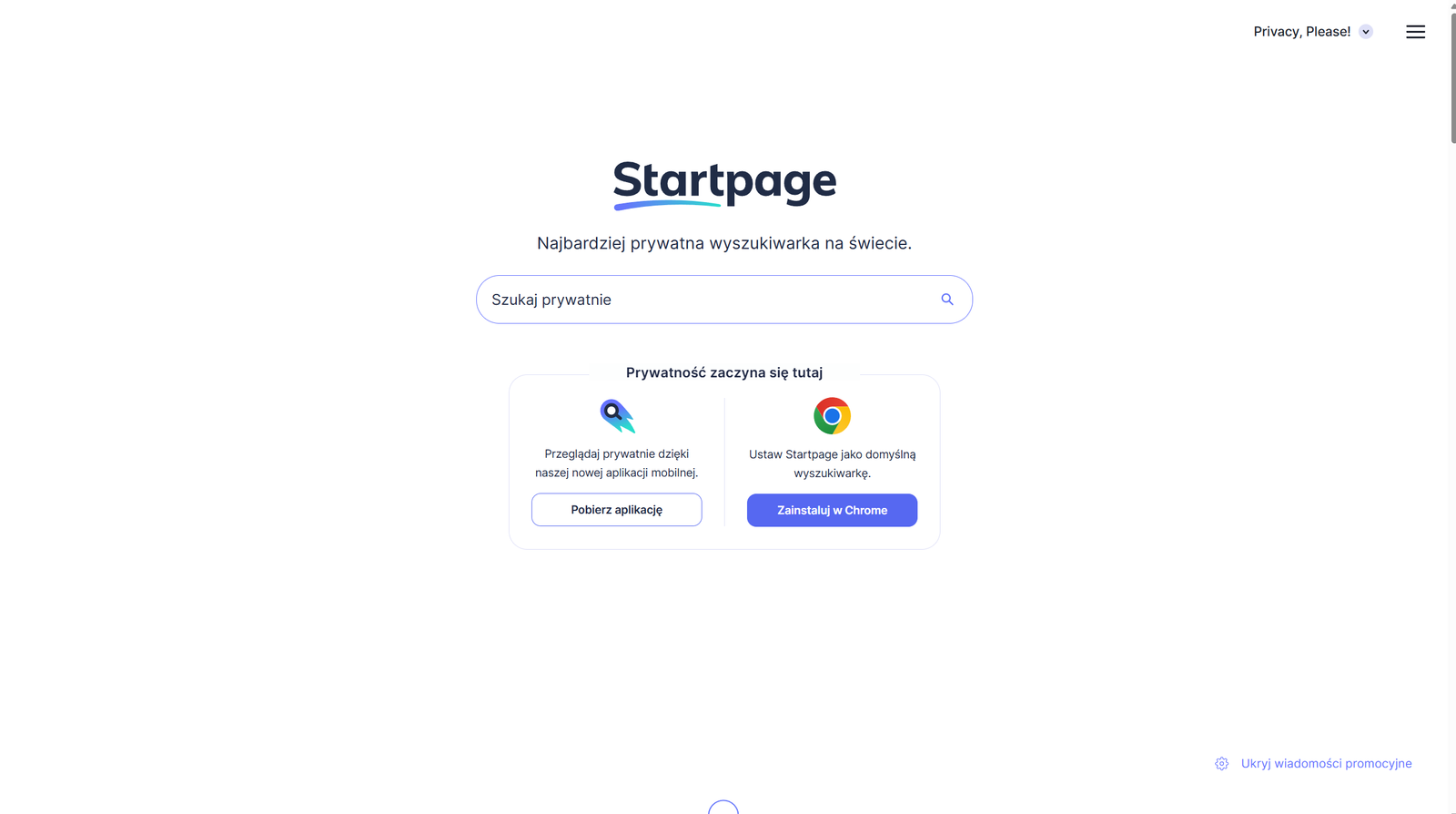 Startpage is an interesting compromise – it uses Google results but strips out all tracking and ads. You get the same quality results without handing your data to Google. Its standout feature is Anonymous View – you can visit sites via Startpage, keeping your IP and data hidden while staying anonymous online.
Startpage is an interesting compromise – it uses Google results but strips out all tracking and ads. You get the same quality results without handing your data to Google. Its standout feature is Anonymous View – you can visit sites via Startpage, keeping your IP and data hidden while staying anonymous online.
Mojeek – full independence
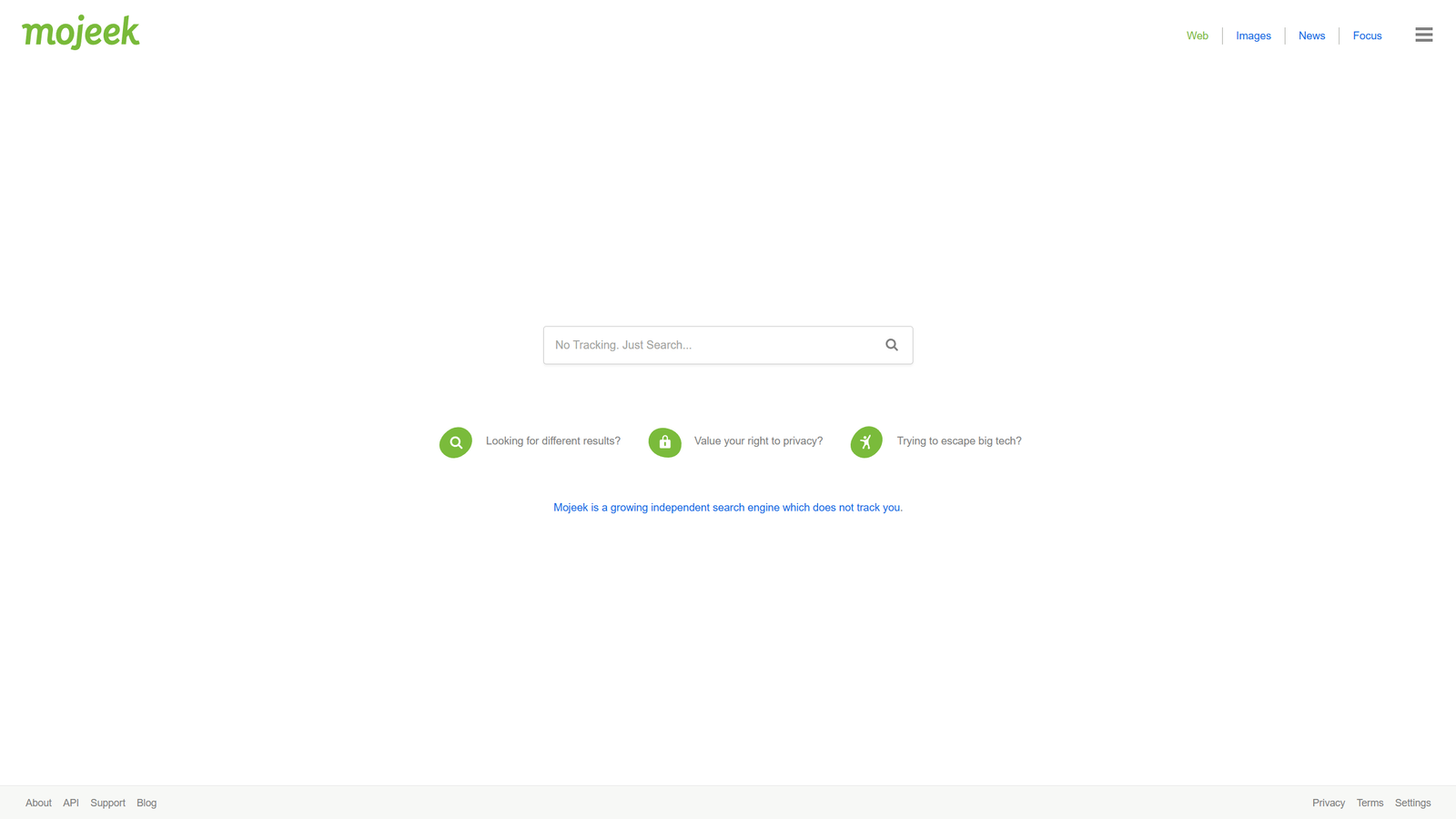 Mojeek is a UK-based search engine that has been building its own index of sites for years. Few players can afford this – creating a database of billions of pages is a huge technological and financial challenge. Mojeek focuses on simplicity, no tracking, and fair results. Unlike Google, it doesn’t filter content or create information bubbles. It’s a raw but honest alternative.
Mojeek is a UK-based search engine that has been building its own index of sites for years. Few players can afford this – creating a database of billions of pages is a huge technological and financial challenge. Mojeek focuses on simplicity, no tracking, and fair results. Unlike Google, it doesn’t filter content or create information bubbles. It’s a raw but honest alternative.
Waterfox – private web search
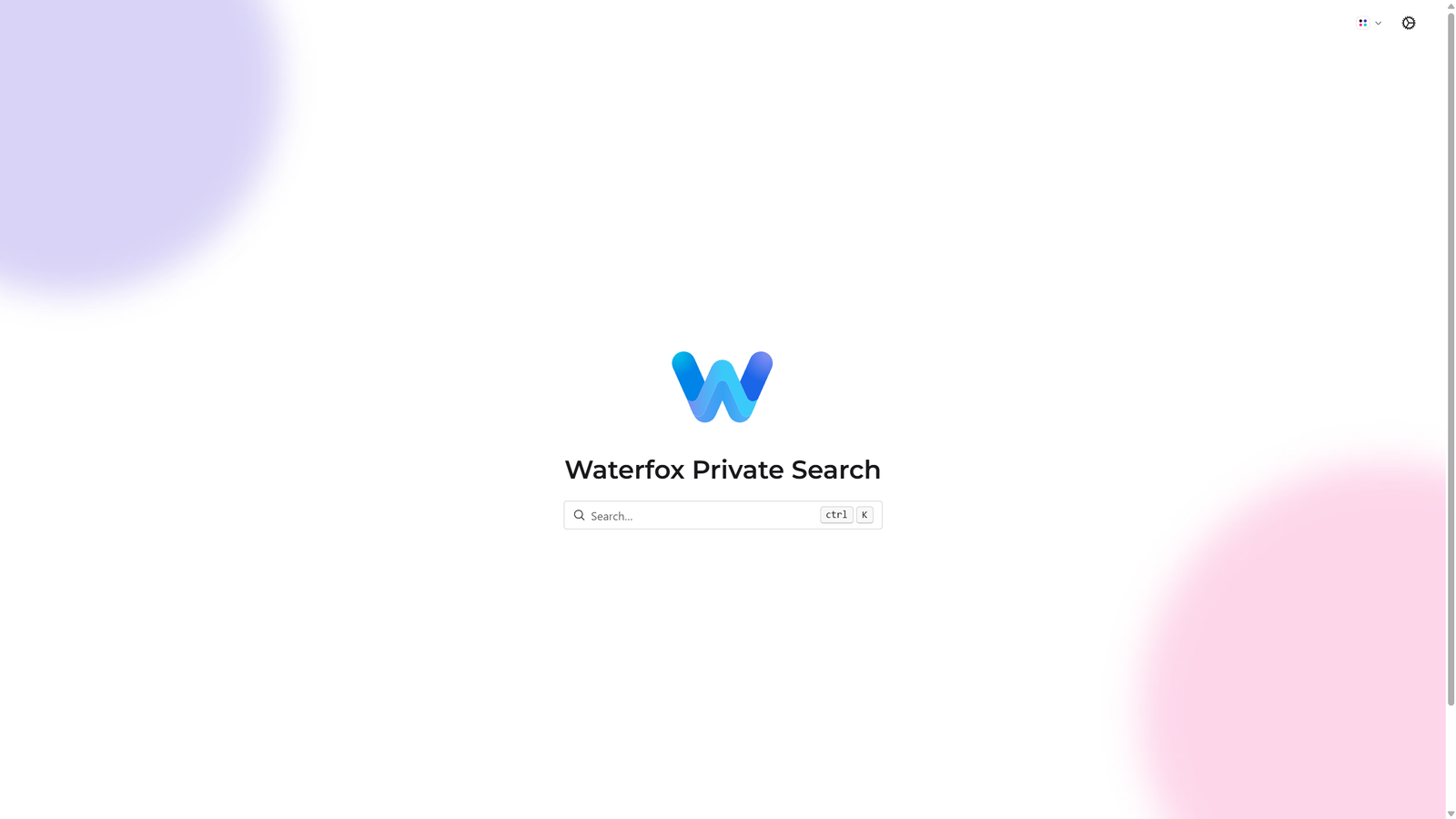 Waterfox Search was developed by the creators of the privacy-focused Waterfox browser. They decided to go a step further and build their own search engine, aiming to cut off reliance on Microsoft and other “middlemen” dominating search results.
Waterfox Search was developed by the creators of the privacy-focused Waterfox browser. They decided to go a step further and build their own search engine, aiming to cut off reliance on Microsoft and other “middlemen” dominating search results.
Presearch – decentralized search engine
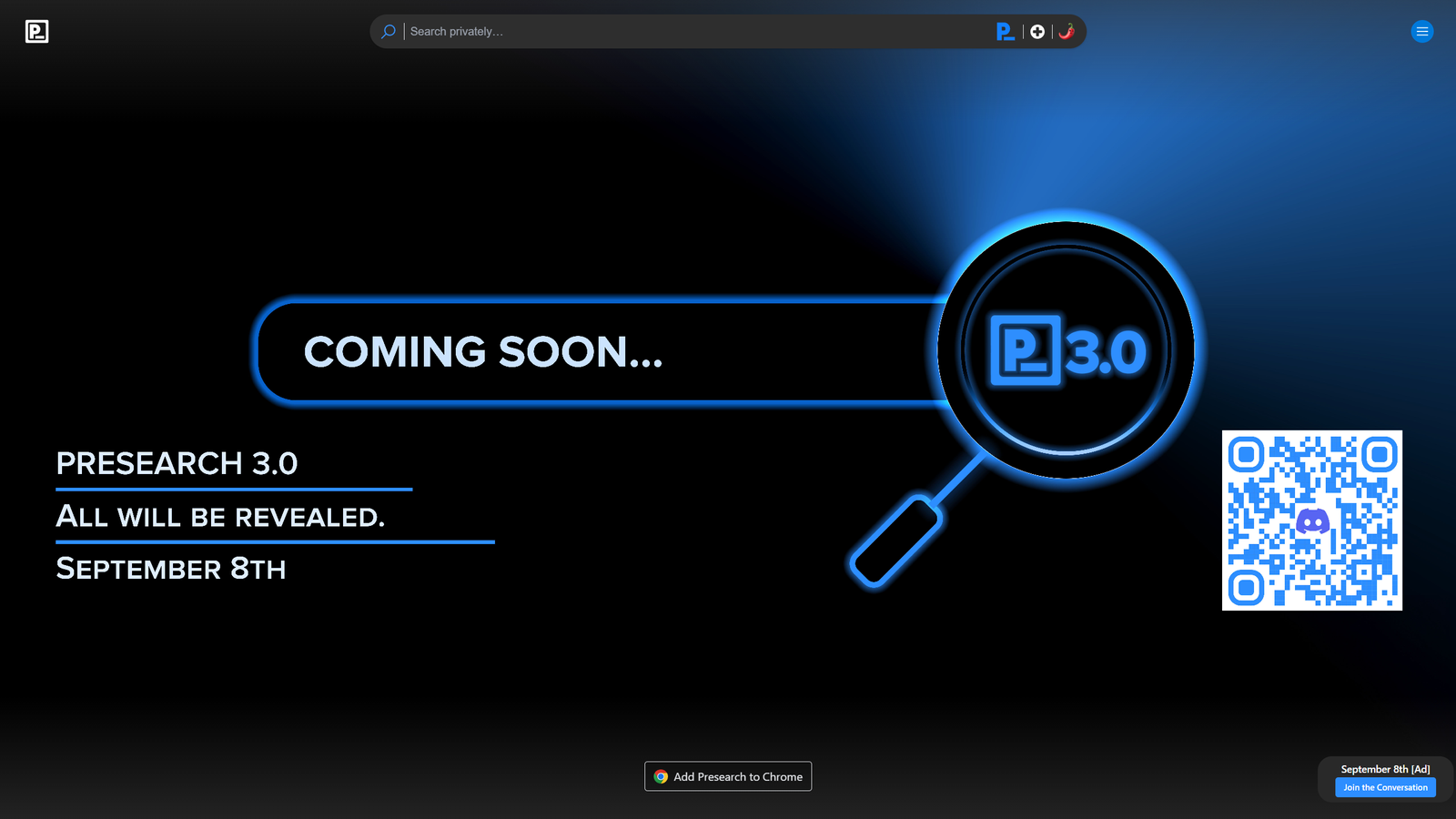 Presearch is unique because it’s community-driven and blockchain-based. Users earn PRE tokens as a reward for searching, which can be used within the ecosystem, e.g., to promote their own websites. This means results are partly shaped by the community, not just algorithms. Privacy is foundational – no tracking, no profiling.
Presearch is unique because it’s community-driven and blockchain-based. Users earn PRE tokens as a reward for searching, which can be used within the ecosystem, e.g., to promote their own websites. This means results are partly shaped by the community, not just algorithms. Privacy is foundational – no tracking, no profiling.
Seek Ninja – the rebel search engine
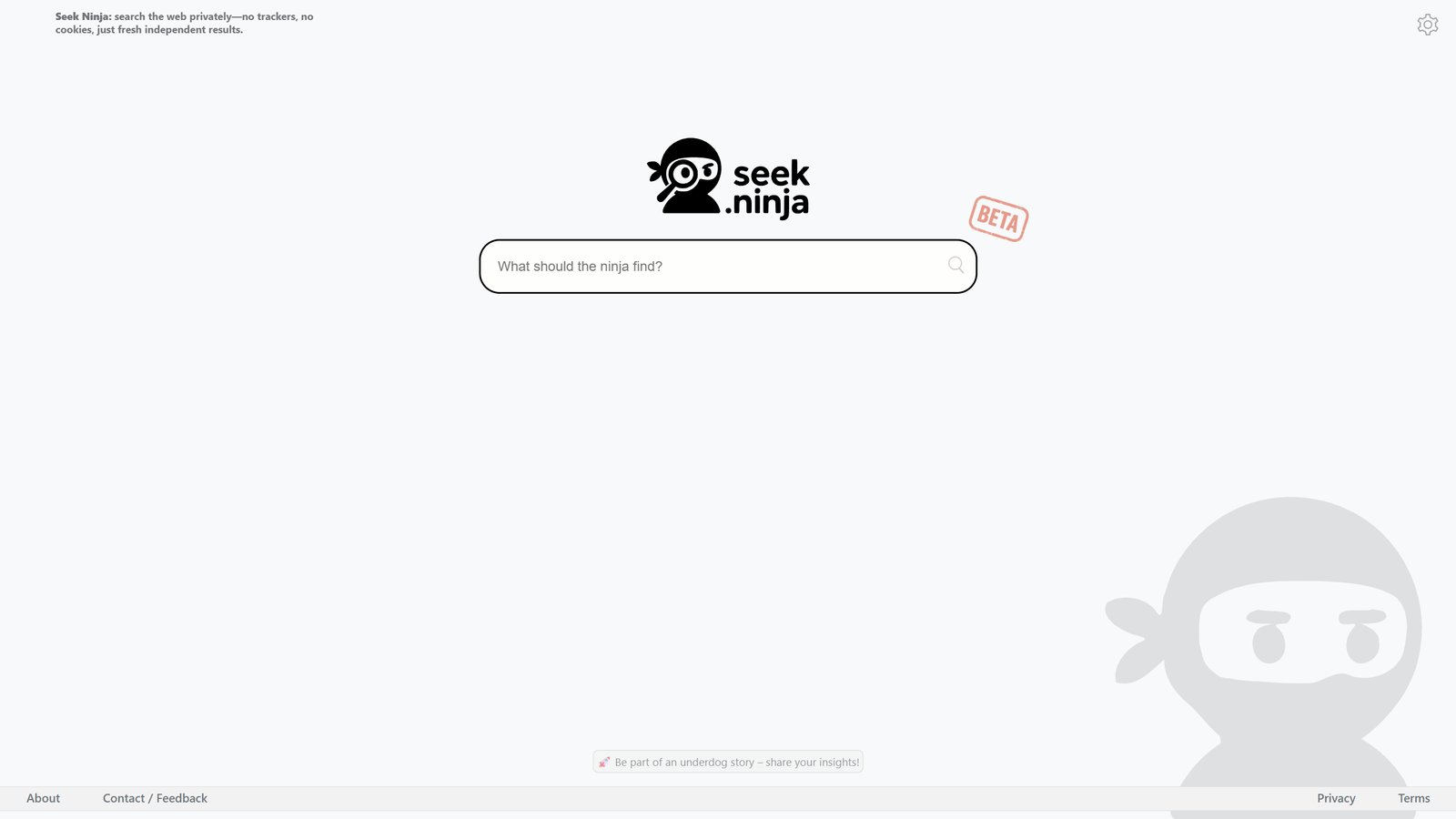 Seek Ninja is a new project building its own index from scratch. Starting with Common Crawl, it adds its own content analysis and ranking methods. The team emphasizes no cookies or tracking identifiers. Their ambition is to challenge the Google-Bing duopoly and create a truly independent search tool.
Seek Ninja is a new project building its own index from scratch. Starting with Common Crawl, it adds its own content analysis and ranking methods. The team emphasizes no cookies or tracking identifiers. Their ambition is to challenge the Google-Bing duopoly and create a truly independent search tool.
MevaSearch – Polish search engine that protects you
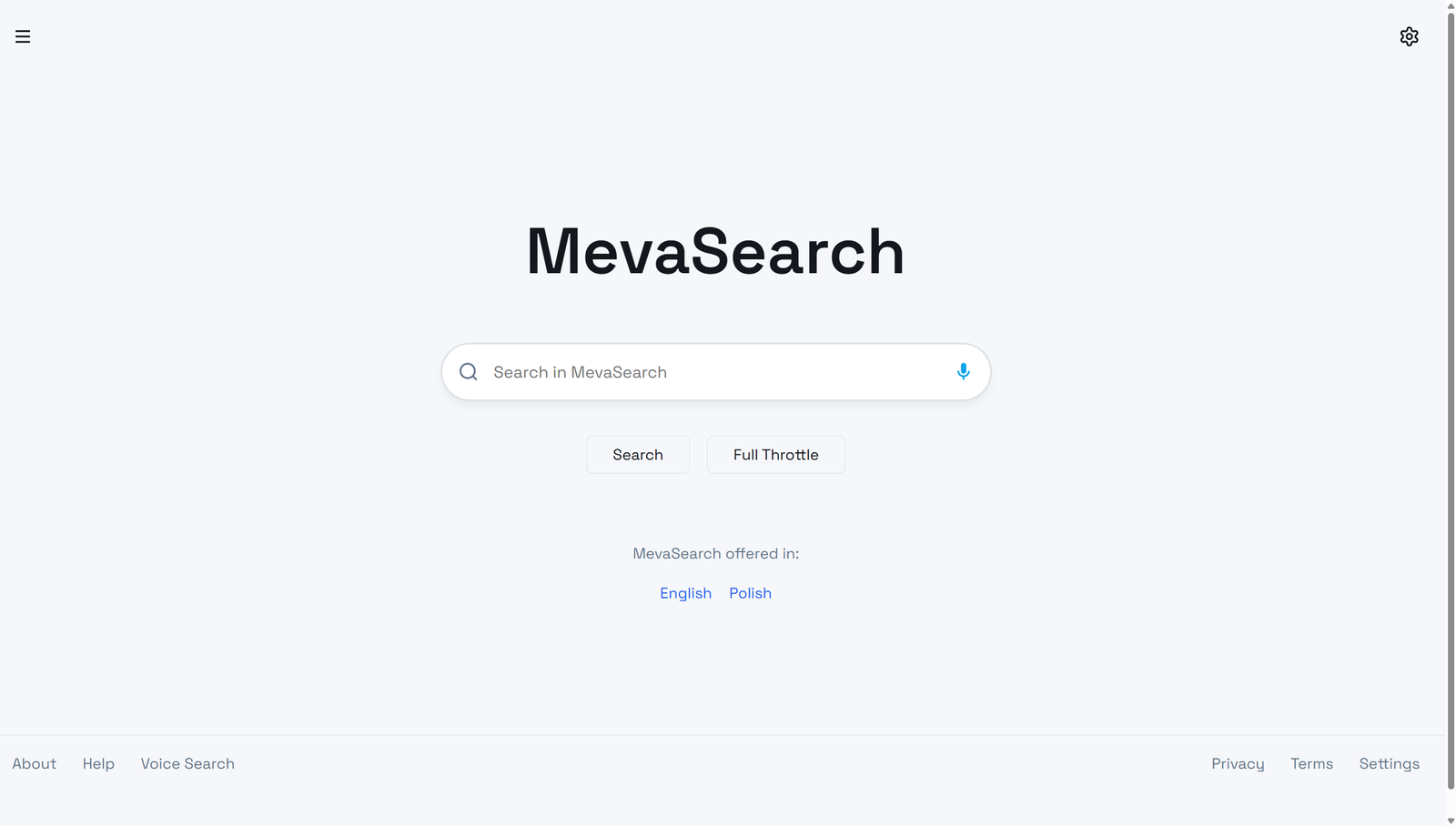 MevaSearch is a Polish search engine we develop. Its core values are safety and privacy. Results are not personalized or filtered. A unique feature is the MevaSearch Guard database, which warns users about potentially dangerous sites, using data from CERT Polska and abuse.ch. It also offers simple tools like a translator, weather, and currency converter.
MevaSearch is a Polish search engine we develop. Its core values are safety and privacy. Results are not personalized or filtered. A unique feature is the MevaSearch Guard database, which warns users about potentially dangerous sites, using data from CERT Polska and abuse.ch. It also offers simple tools like a translator, weather, and currency converter.
Heexy – speed and simplicity
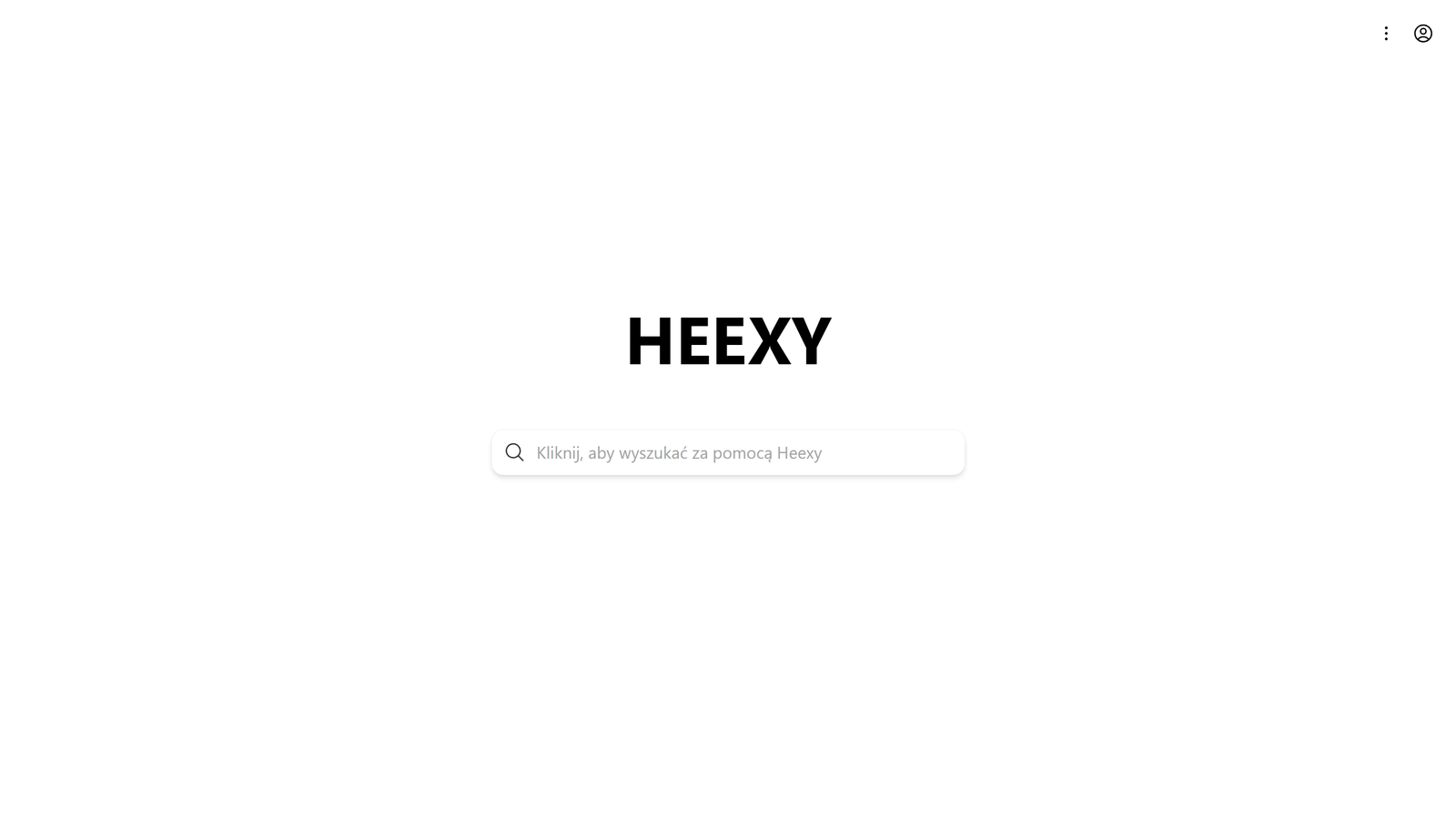 Heexy focuses on simplicity and a clean interface. Instead of piling on extra features, it prioritizes speed and result relevance. The result is a search engine that’s intuitive to use, without overwhelming options or ads.
Heexy focuses on simplicity and a clean interface. Instead of piling on extra features, it prioritizes speed and result relevance. The result is a search engine that’s intuitive to use, without overwhelming options or ads.
YEP – search engine for creators
 YEP is developed by Ahrefs, known in SEO and data analytics. Its main goal is to share ad revenue with content creators. Unlike Google, which keeps nearly all revenue, YEP ensures website owners get a share. Privacy is also key – no user profiling or thin content. YEP promotes quality and transparency while giving hope for a fairer web.
YEP is developed by Ahrefs, known in SEO and data analytics. Its main goal is to share ad revenue with content creators. Unlike Google, which keeps nearly all revenue, YEP ensures website owners get a share. Privacy is also key – no user profiling or thin content. YEP promotes quality and transparency while giving hope for a fairer web.
Kagi – premium search engine
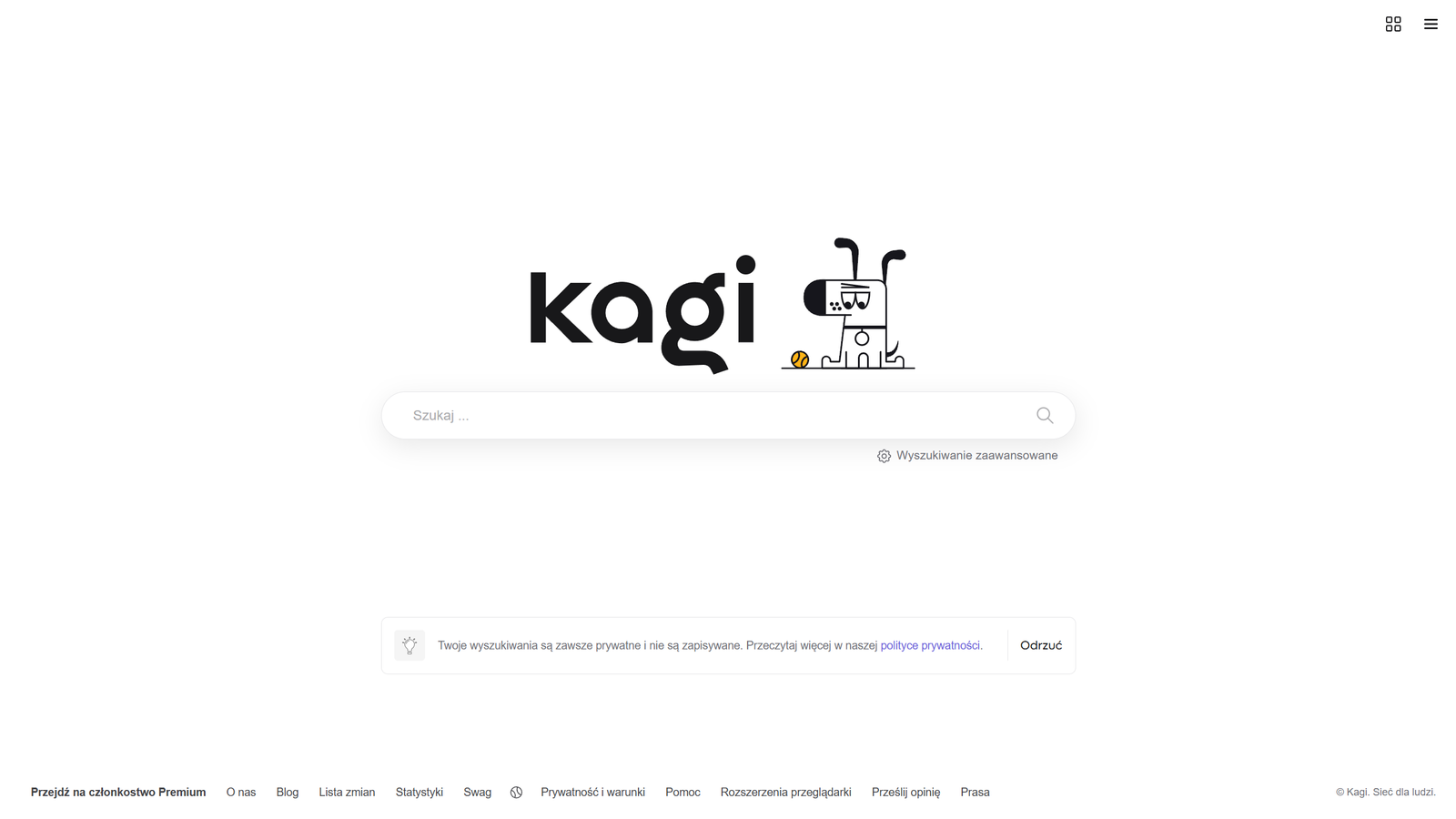 Kagi is a different model – no ads, no tracking, but a subscription fee. This premium search engine is funded by users, ensuring results are free from sponsored content and focus solely on quality. Kagi uses its own index combined with top-tier provider data, giving priority to truly valuable pages. It’s like Netflix for search – for those who want to pay for a better experience.
Kagi is a different model – no ads, no tracking, but a subscription fee. This premium search engine is funded by users, ensuring results are free from sponsored content and focus solely on quality. Kagi uses its own index combined with top-tier provider data, giving priority to truly valuable pages. It’s like Netflix for search – for those who want to pay for a better experience.
Spot – lightweight SearX alternative
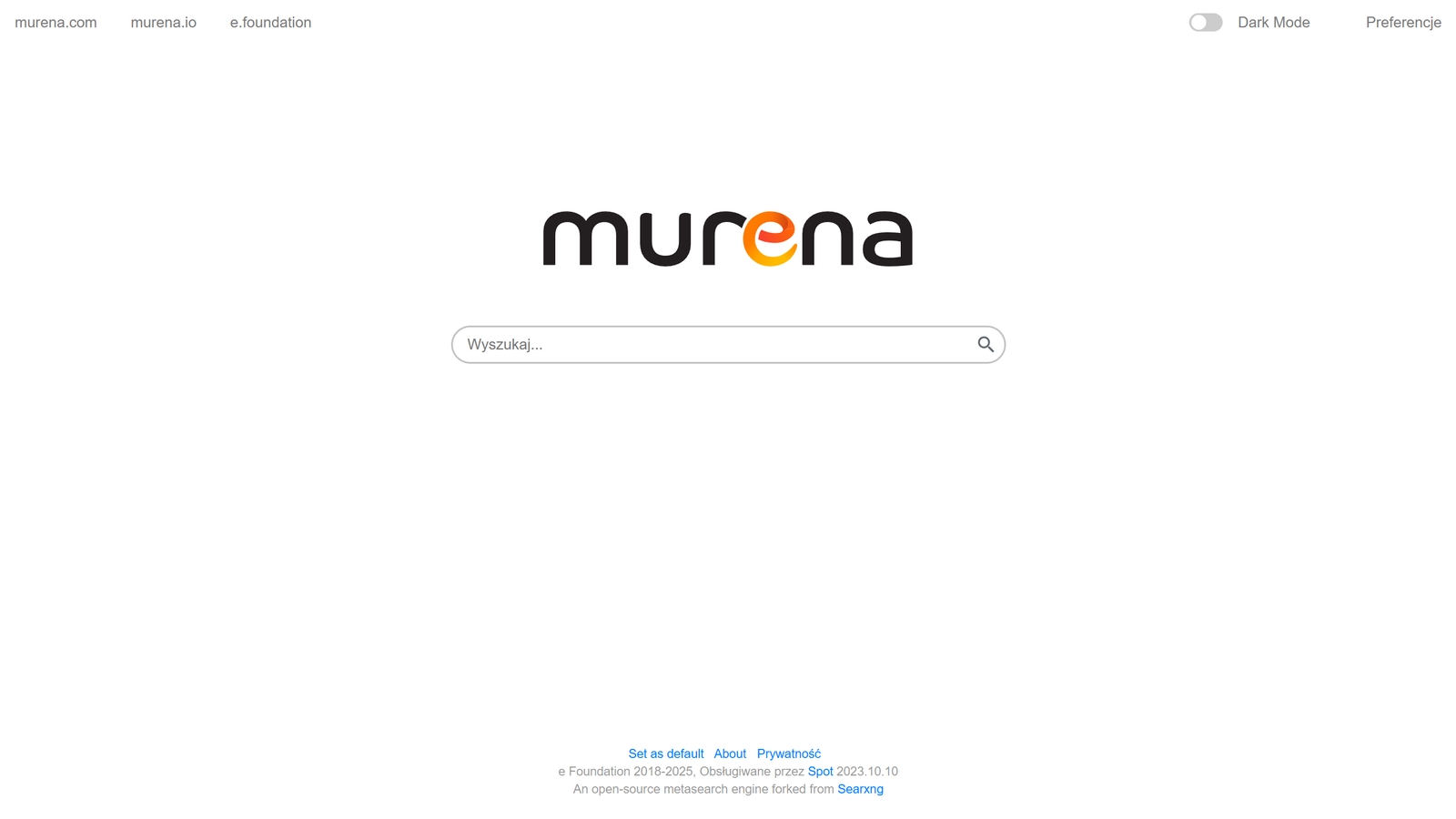 Spot is a fork of SearX, the open-source metasearch engine. Like the original, it aggregates results from various sources and doesn’t store user data. Differences lie in code approach and implementation details, but the idea is the same: private searching, no tracking, and the option to self-host your own instance.
Spot is a fork of SearX, the open-source metasearch engine. Like the original, it aggregates results from various sources and doesn’t store user data. Differences lie in code approach and implementation details, but the idea is the same: private searching, no tracking, and the option to self-host your own instance.
Tempest – control over your digital life
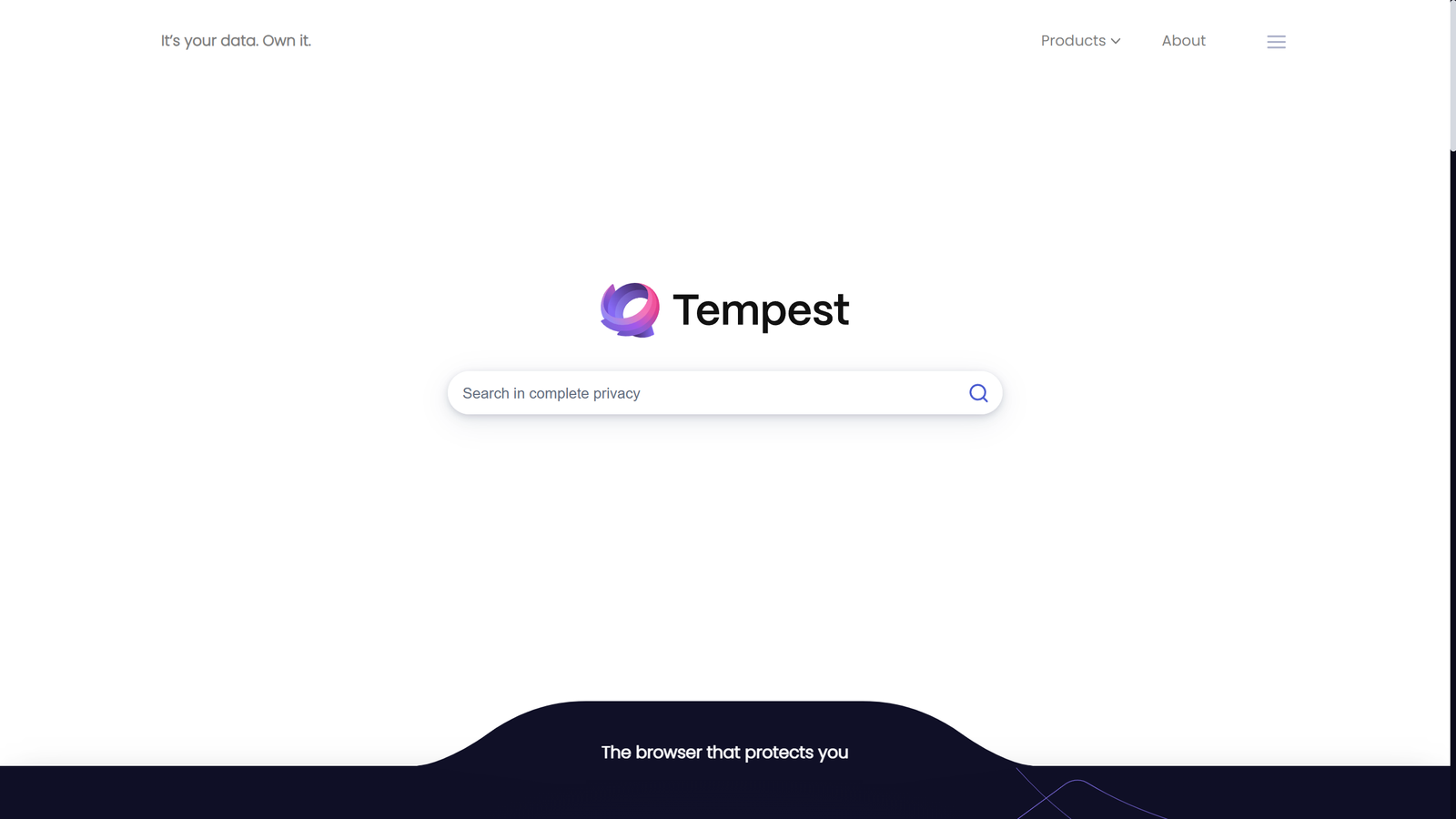 Tempest is an independent company prioritizing user privacy and combating algorithmic manipulation. Unlike Google, which builds detailed profiles including political preferences and social status, Tempest claims results are based purely on objective relevance.
Tempest is an independent company prioritizing user privacy and combating algorithmic manipulation. Unlike Google, which builds detailed profiles including political preferences and social status, Tempest claims results are based purely on objective relevance.
Rapusia – search engine for good
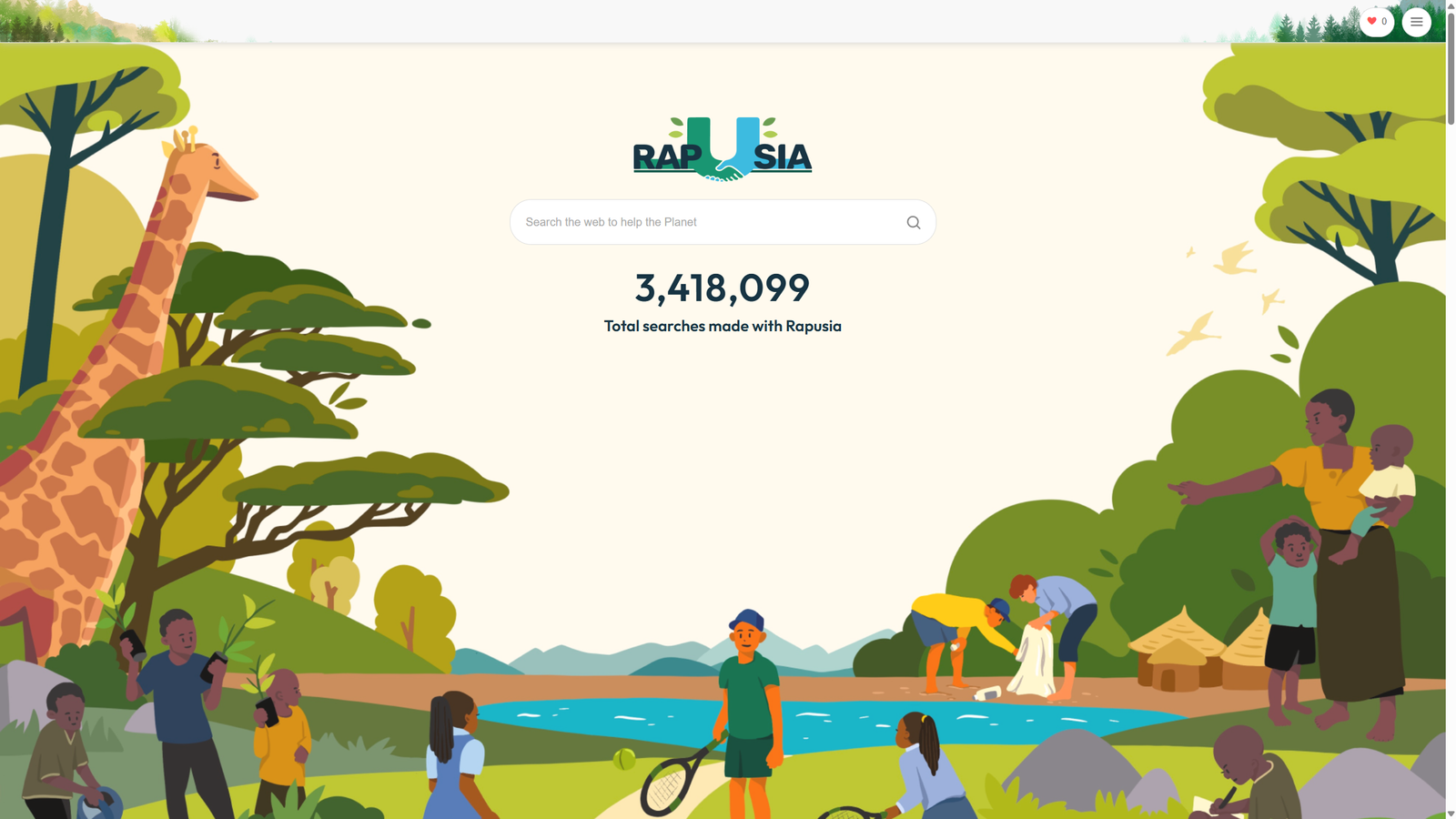 Rapusia is a non-profit project supporting charitable organizations. Every time you search, a portion of revenue goes to selected foundations. Users can vote on which initiatives receive support, making Rapusia a truly community-driven search engine.
Rapusia is a non-profit project supporting charitable organizations. Every time you search, a portion of revenue goes to selected foundations. Users can vote on which initiatives receive support, making Rapusia a truly community-driven search engine.
Good – ad-free search
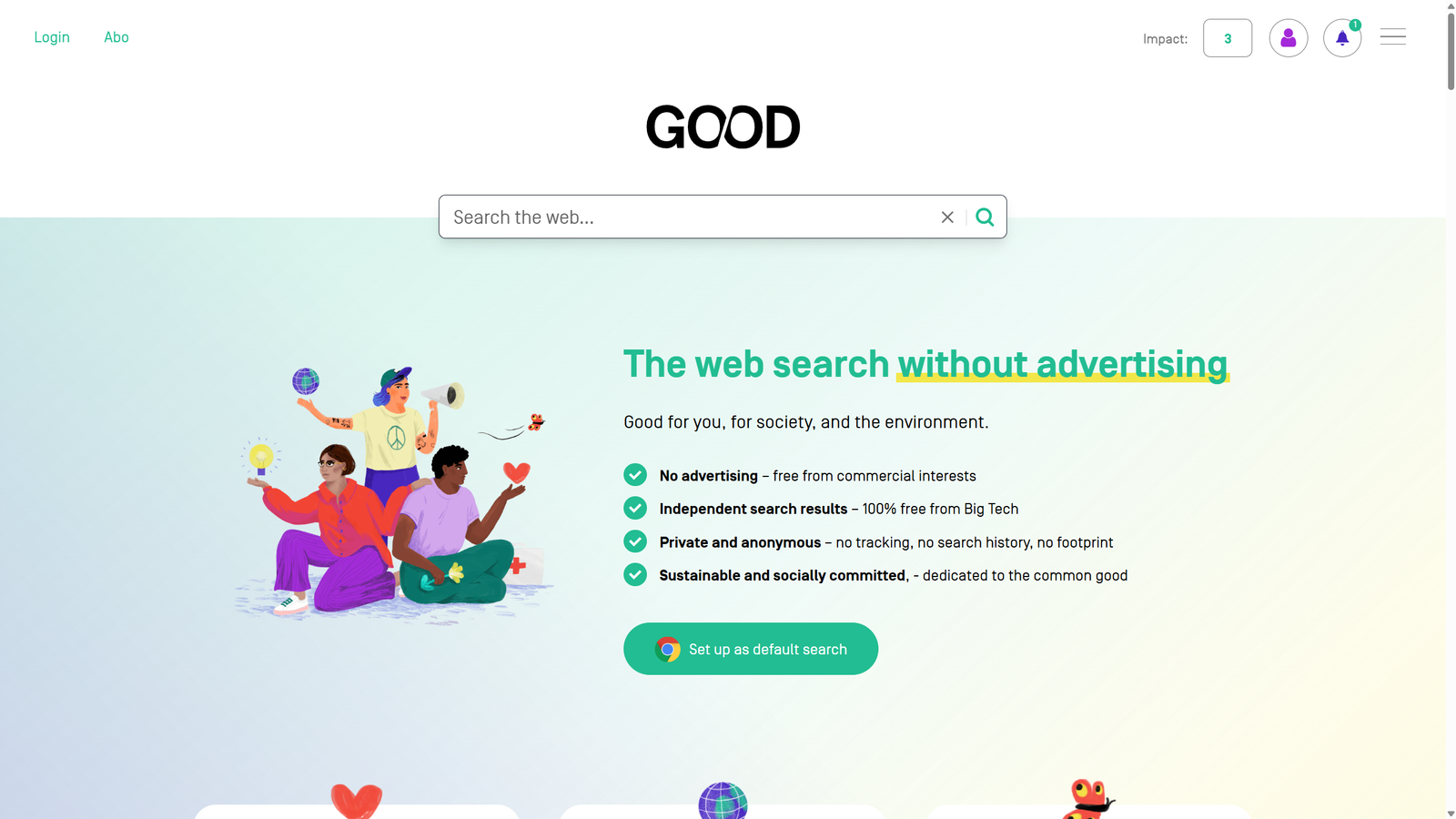 Good Search is an independent search engine based on the Brave index. No ads, no tracking, no selling of data. It relies on voluntary subscriptions, with part of the funds supporting social projects aligned with UN goals. There’s a limit on free searches. Ideal for those who want to support socially responsible internet.
Good Search is an independent search engine based on the Brave index. No ads, no tracking, no selling of data. It relies on voluntary subscriptions, with part of the funds supporting social projects aligned with UN goals. There’s a limit on free searches. Ideal for those who want to support socially responsible internet.
Lilo – your searches, your support
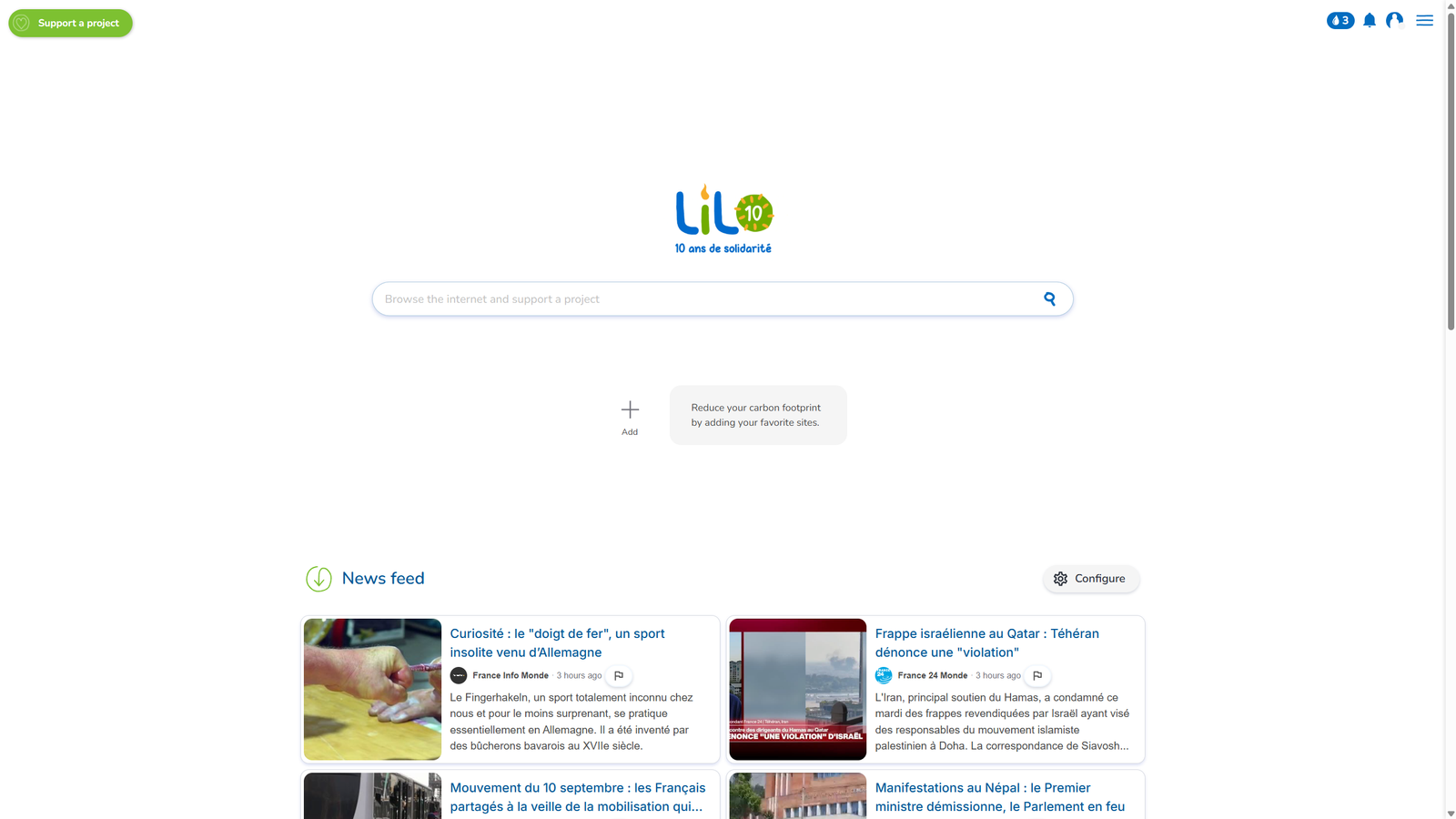 A French search engine letting users decide which initiatives receive revenue. Each search generates “water drops” – virtual currency that can be donated to social or ecological projects. Using the internet becomes real-world action.
A French search engine letting users decide which initiatives receive revenue. Each search generates “water drops” – virtual currency that can be donated to social or ecological projects. Using the internet becomes real-world action.
YouCare – helping with every search
 YouCare is a charity search engine where every search translates into concrete help – feeding animals, planting trees, or medical aid. Users choose the cause, turning everyday searches into micro-donations. A great example of tech working for good, not just profit.
YouCare is a charity search engine where every search translates into concrete help – feeding animals, planting trees, or medical aid. Users choose the cause, turning everyday searches into micro-donations. A great example of tech working for good, not just profit.
Oscobo – privacy made in the UK
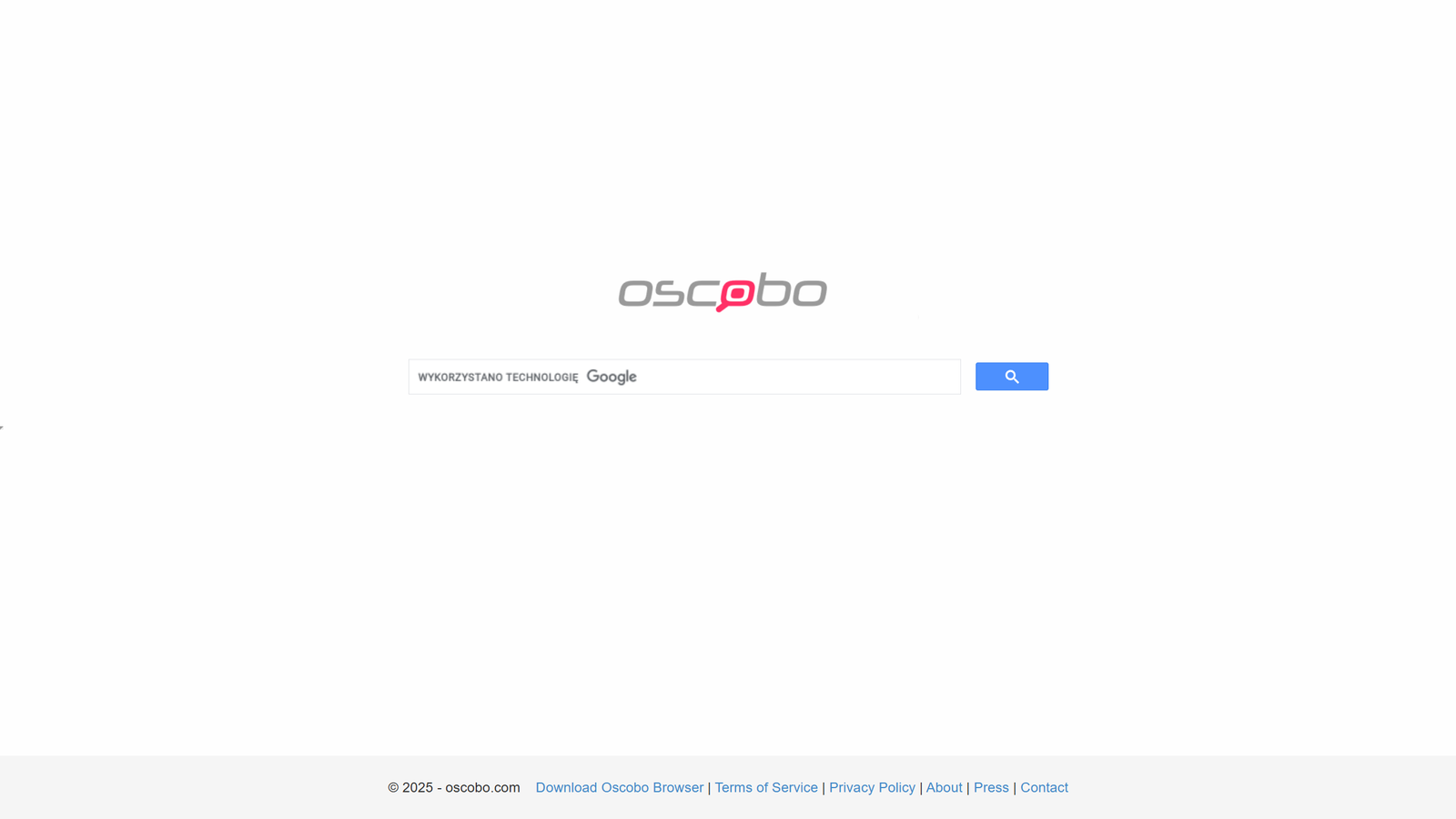 Oscobo is a UK search engine built for privacy. It doesn’t collect data, store search history, or track users. Its business model relies on simple contextual ads that don’t require profiling. Browse the web without feeling monitored.
Oscobo is a UK search engine built for privacy. It doesn’t collect data, store search history, or track users. Its business model relies on simple contextual ads that don’t require profiling. Browse the web without feeling monitored.
ZIZOO.PL – Polish search for Polish internet
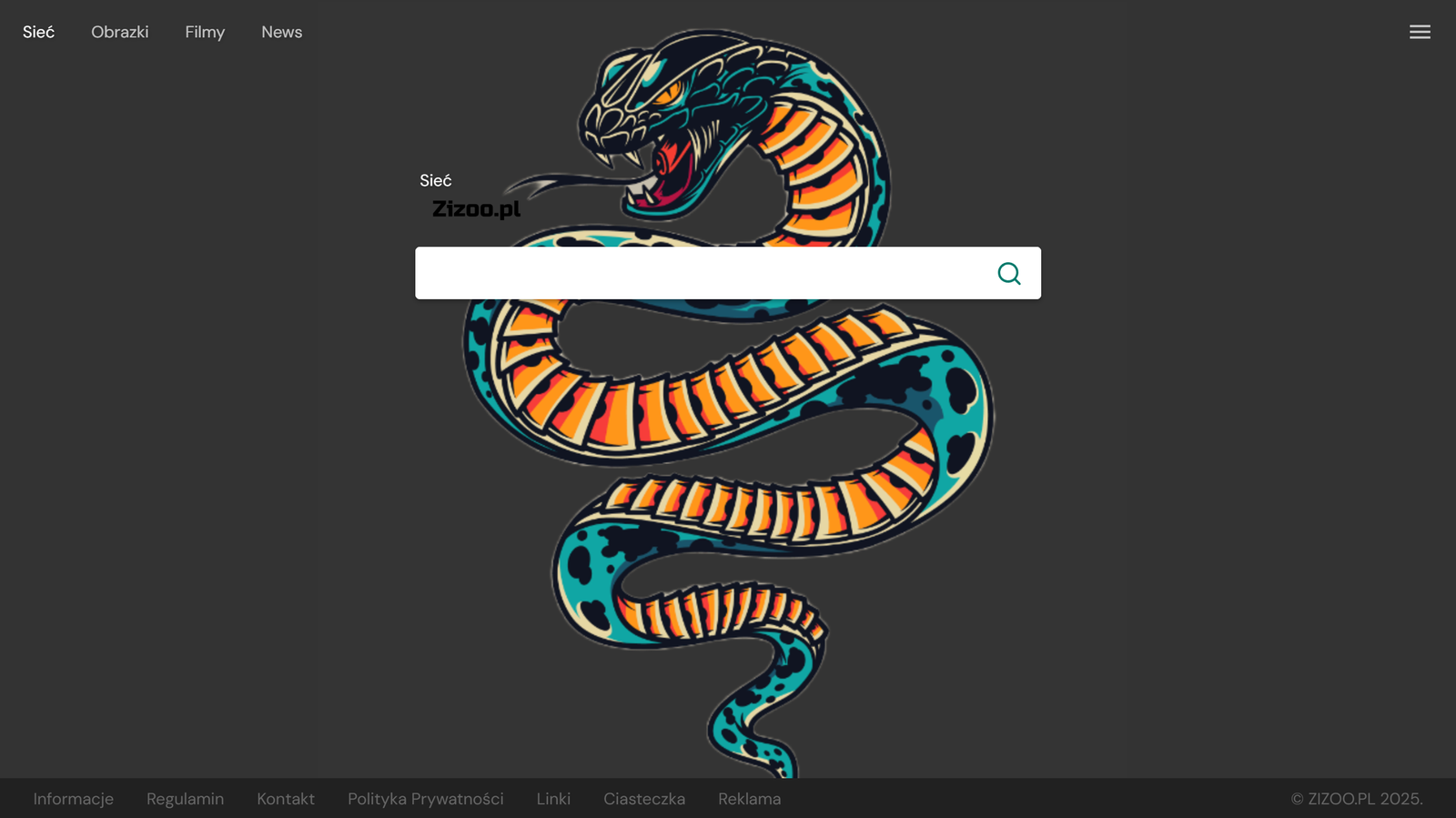 ZIZOO.PL is a Polish search engine designed to search Polish websites simply and intuitively. User privacy is a priority – it doesn’t collect personal data invasively and uses standard cookies for site optimization.
ZIZOO.PL is a Polish search engine designed to search Polish websites simply and intuitively. User privacy is a priority – it doesn’t collect personal data invasively and uses standard cookies for site optimization.
Worth going off the beaten path
The world of search engines is far richer than it seems. From the eco-friendly Ecosia to the premium Kagi and Poland’s MevaSearch – each alternative brings something new. If you value privacy, quality results, or want to support content creators, sometimes it’s worth stepping aside from the giants and trying something different.